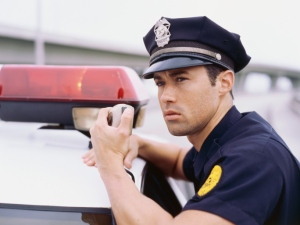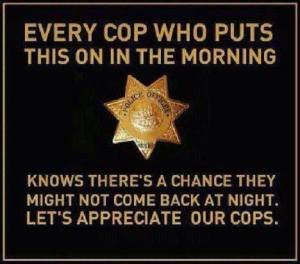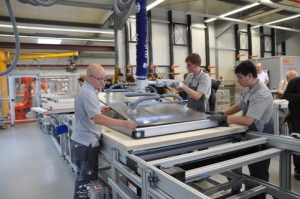 Last week was National Police Week. I think it’s a great idea. Police don’t have an easy job, so it’s thoughtful to set aside a week honoring their contributions to our communities. Unfortunately, had it not been for Facebook, I’m not sure I would have known about it. I have no idea what Richfield, MN—where I live—did to celebrate it, and even on Facebook I only saw two acknowledgements of it.
Last week was National Police Week. I think it’s a great idea. Police don’t have an easy job, so it’s thoughtful to set aside a week honoring their contributions to our communities. Unfortunately, had it not been for Facebook, I’m not sure I would have known about it. I have no idea what Richfield, MN—where I live—did to celebrate it, and even on Facebook I only saw two acknowledgements of it.
One of the Facebook posts didn’t even really celebrate National Police Week. Instead, it was a dish of sour grapes from a law enforcement officer in the form of a “humorous” police voice message that concluded with a statement informing the benighted public: “We’re here to save your butts, not kiss them.” It’s not exactly the kind of sentiment that will warm the hearts of those who have complex feelings about the police and, to my mind, actually articulates an attitude that contributes to the very problem it supposedly describes. I don’t know about you, but I don’t want police to kiss my butt. I want them to treat me with some dignity and respect.
 More in the spirit of National Police Week, in my opinion, was the post featuring a photo of a badge, and the caption, “Every cop who puts this on in the morning knows there’s a chance they might not come back at night. Let’s appreciate our cops.” That seems like a great reason to honor those who have taken up this profession—they’re risking their lives to serve their communities. How often do we reflect on that? I know I don’t unless I’m asked to. And that’s why National Police Week is a good idea.
More in the spirit of National Police Week, in my opinion, was the post featuring a photo of a badge, and the caption, “Every cop who puts this on in the morning knows there’s a chance they might not come back at night. Let’s appreciate our cops.” That seems like a great reason to honor those who have taken up this profession—they’re risking their lives to serve their communities. How often do we reflect on that? I know I don’t unless I’m asked to. And that’s why National Police Week is a good idea.
But it got me to thinking: there are deadlier professions than law enforcement. In fact, according to statistics compiled by the Bureau of Labor Statistics, from the years 2010 to 2012, law enforcement only cracked the top ten deadliest professions once, in 2011, at number 10, when they experienced 18 deaths per 100,000 officers, for a total of 133 fatalities nationwide. The profession in the number one spot that year, regularly occupying the number one or two slot of deadliest professions, was commercial fishing, which had a mortality rate seven times that of what was reported for police officers. But how many times are we asked to reflect on the sacrifice made by commercial fishermen to feed the world?
 In fact, there are many other unsung professions that are also deadlier than being a police officer. Why can’t we set aside a week for them, too? How many are aware of the risk run by roofers (the fourth deadliest profession in 2012, with 40.5 deaths per 100,000 workers), loggers (the deadliest profession of 2012 with a jaw-dropping rate of 127.8 deaths per 100,000 workers), or refuse and recyclable material collectors (ranking number six, with 27.1 deaths per 100,000 workers). Why might it seem ignoble to us to devote a week to honoring refuse collectors? Like police officers, they do a great service to our communities, and apparently they put their lives on the line to do it. At least there is a day set aside to honor them: National Garbage Man Day. It is June 17, by the way. Take time out that day to thank and celebrate those who help keep our cities clean.
In fact, there are many other unsung professions that are also deadlier than being a police officer. Why can’t we set aside a week for them, too? How many are aware of the risk run by roofers (the fourth deadliest profession in 2012, with 40.5 deaths per 100,000 workers), loggers (the deadliest profession of 2012 with a jaw-dropping rate of 127.8 deaths per 100,000 workers), or refuse and recyclable material collectors (ranking number six, with 27.1 deaths per 100,000 workers). Why might it seem ignoble to us to devote a week to honoring refuse collectors? Like police officers, they do a great service to our communities, and apparently they put their lives on the line to do it. At least there is a day set aside to honor them: National Garbage Man Day. It is June 17, by the way. Take time out that day to thank and celebrate those who help keep our cities clean.
Of course, people risk their lives in other, less immediate ways, too. There are those who work in industries that expose them to dangerous chemicals, whose effects might take longer to manifest or might not be easy to ascertain. Then there are others who take up occupations that ask one forego a comfortable, middle-class life, such as some in the clergy—I’m suspicious of those who seem to be making a healthy income through religion—and artists, who are, more often than not, offered a pittance for their work if anything (and those who aren’t usually have had the incredible good luck to be famous).
Novelist William S. Burroughs, for example, at the age of eighty-three, almost forty years after his notorious book Naked Lunch was published, wrote in his final journals: “I [was] described by a moron critic as the world’s richest ex-junky. If $1,500 in [the] bank and no other assets made me the richest.” And, toward the end of his life, as Patti Smith relays in her wonderful memoir Just Kids, the photographer Robert Mapplethorpe asked Smith, not without some regret, “Patti, did art get us?” After telling him she didn’t know, Smith adds, to herself, “Perhaps it did, but no one could regret that. Only a fool would regret being had by art.” But that monastic attitude toward art by artists is practically expected by society, so we often don’t recognize all that artists give up to be artists.
I could go on about the cost exacted by many professions—for example, according to the National Institute for Occupational Safety and Health professions like dentist, doctor, and marine engineer have suicide rates roughly two times the national average—but I don’t want to imply that it is only through suffering that professions should be celebrated. I would, in fact, prefer to celebrate what they contribute. True, there are those professions considered inherently positive in some abstract sense, though when considered in the muddy water of everyday life are gutted with vitriol, like teaching or policing. Wouldn’t it be nice to remember the feelings stirred by our ideals of those professions before lambasting those who might be trying their best to live up to them but are only human?
 Then there are those professions that might never be considered for special attention, like truck driver or packaging machine operator. Without them, many necessary goods would not be available for our consumption. Those who devote their lives to those jobs work hard so we all can have a better life. A quarter of a century ago, I spent part of a summer finishing and assembling plastic display cases for silverware. The work was tedious, required some skill, and involved serious machinery, so one’s attention couldn’t wander far, which, as a long-time meditator, I can assure you isn’t easy when the task isn’t exciting, especially if you don’t have any practice at keeping your attention focused. And while making display cases might not save someone’s butt, somebody needs it to be done, so doing it is part of chipping in.
Then there are those professions that might never be considered for special attention, like truck driver or packaging machine operator. Without them, many necessary goods would not be available for our consumption. Those who devote their lives to those jobs work hard so we all can have a better life. A quarter of a century ago, I spent part of a summer finishing and assembling plastic display cases for silverware. The work was tedious, required some skill, and involved serious machinery, so one’s attention couldn’t wander far, which, as a long-time meditator, I can assure you isn’t easy when the task isn’t exciting, especially if you don’t have any practice at keeping your attention focused. And while making display cases might not save someone’s butt, somebody needs it to be done, so doing it is part of chipping in.
I say we shouldn’t elevate certain professions above others, insisting they’re somehow more important or contribute more to a community. But rather than scrap celebrating those professions, I would like to celebrate all the work that we do. However, let’s not celebrate all jobs on one day like Labor Day, as nice as that is. It doesn’t really ask us to stop and reflect on those goods and services that we don’t pay attention to because we take them for granted. I would like something like Police Week for everyone, so that we truly can take the time to appreciate what we have and realize that our lives are wholly interdependent with the lives of others, no matter what we might otherwise think, and that it is a wonderful thing.

